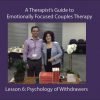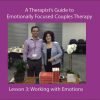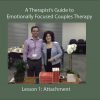The first decision couples have to make when they are in distress and seeking the help of a professional is, of course, who to go to see.
Couples therapists vary in training and experience and they also can be quite different in the approaches they use. It is therefore important for couples to do a little bit of research on their own in order to understand their options and make a conscious choice about the approach that sounds most appealing to them.
First of all, couples need to understand that not all therapists who offer couples therapy have any formal training in working with couples. There are currently no rules or regulations in place that prevents a licensed mental health professional without special training in couples therapy from offering couples therapy or referring to themselves as a couples therapist.
Increasingly, however, it is being recognized that good results in couples therapy depend on the therapist’s level of training and experience, as well as the specific approach they use.
In a previous article, I have explained more about one such approach, which is currently quite popular:

The research on happy and distressed couples carried out by John Gottman has led to insights about what couples can do to make their relationships work... > Read More
In this blog post, I want to talk about another effective approach to couples therapy often referred to as EFT, or Emotion-Focused Therapy.
What is EFT?
EFT or Emotion-Focused Therapy is an approach to couples therapy which, as the name indicates, focuses on emotions.
Emotions are like the music that controls a couple’s relationship dance.
The fights and arguments couples have are often not about the content of what is said, but about the emotional underpinnings of how things are said, or how what is said makes us feel.
To give an example: It is not that I tell you that I will fix a broken cabinet tomorrow that is the problem, but the slight indifference or annoyance that seeps through my words when I say it. It is not that my partner is really angry about the cabinets not being fixed, but that he or she hears my indifference as a sign that I don't really care and that I am not really "there" emotionally when he or she needs me.
Although we may be fighting about cabinets, what we are really reacting to in each other are the emotional messages that are passed back and forth. Messages that often communicate something to us about how much we can count on each other, how safe it is to express our opinions, how loved we really are, or how much our partner really cares.
A fight about cabinets, which can seem unreasonable if taken at face value, is thus often a fight about much deeper emotions and relationship concerns.
EFT recognizes that couples in such situations do not need better ways to communicate about cabinets or help to implement more sharing of responsibilities. Instead they need help to truly get in touch with the emotions and feelings that are stirring within and that are generating negative feelings about themselves or their partner. Only when partners can fully get in touch with these emotions, can they have conversations about what really matters, instead of getting bogged down in arguments about petty little details that don’t really address the real issues.
Getting to the Root of The Problem:
When couples seek couples therapy it is often because they are stuck in an emotional dance of which they are not fully aware. They are reacting to something perceived as missing or overwhelming in their relationship. Oftentimes one partner feels not cared about or unsure of the other person’s interest or commitment to them or the relationship, and the other feels afraid of conflict and starts to pull away and becomes more distant out of a need to avoid criticism.
To get out of this stalemate, couples first need to understand the emotional undercurrents of the dance they are dancing. They need to understand that one partner’s constant frustrations and nitpicking is fuelled by a sense of emptiness or loneliness that they don’t know how to express or how to get rid of. They also need to understand that the other partner’s increasing disengagement and emotional distancing is fuelled by a fear of messing up, a distaste for feeling inadequate, or a concern that talking about issues will make their partner want to leave.
What happens in an EFT session?
EFT therapists are skilled at honing in on the underlying music of a couple’s relationship dance. They help couples dig beneath the outward expression of anger, or the self-protective need to withdraw. Once couples are able to get to the heart of the matter and truly feel where their anger or disengagement stems from, EFT therapists help choreograph new interactions between partners in the sessions, that are based on greater self-awareness and a fuller access to one’s own complex emotional life. These new interactions, which are often centered around fears, longings, and vulnerabilities, help draw partners closer to each other, and open up new relationship dimensions that increase the safety of being in a relationship as your true self.
EFT therapists help partners get out of the negative interactions, which deteriorate their bonds over time, and help partners reengage in new ways that strengthen these bonds.
Benefits of EFT over Other Approaches:
What I most like about EFT is that it works with resources that are already existing within each individual. The cure for a couple’s ailments is to get more in touch with themselves and to communicate what they truly think and feel at a more authentic level than they have been able to do in the past. This means that you will not simply be taught to use “I statements” or engage in exercises or new ways of doing things, which can often seem forced, unnatural, and maybe even cheesy. Instead you are learning how to simply share more of yourself, using your own words, and expressing yourself in a way that is a true reflection of how you really feel.
Another thing I like about EFT is that is not a cognitive, but an emotional therapy. The results you derive from the therapy are not simply due to increased knowledge or skills, but due to an emotional relearning that goes beyond a simple cognitive understanding. This means that the results from the therapy are much more likely to feel ingrained in your sense of self and become part of you, rather than to feel like a set of tools or ways of thinking that you need to consciously apply. This also means that EFT is more likely have lasting effects on a couple because it truly changes how you view yourself and your partner. EFT is subsequently one of the approaches to couples therapy that has most research supporting its long-term effectiveness. And it has one of the lowest documented relapse rates.
Drawbacks to EFT:
The biggest drawback to EFT is that it requires a willingness, openness, and ability to get in touch with your inner emotional life. For some partners this can be extremely difficult, especially if you feel a great sense of shame about certain of your emotions, or if you have learned to numb yourself to your emotions and discount them to an extent that they are no longer really accessible. Although EFT couples therapists have a number of ways to help you get in touch with your emotions and bypass some of these obstacles, you have to be willing to open up about yourself and get in touch with your feelings. If you feel too uncomfortable with emotions or if you prefer an approach that focuses more on problem-solving and intellectual understanding, you will be better off looking for a therapist with a different approach.
Another drawback to EFT is that it is primarily intended for couples who have a strong commitment and love for each other. If your heart really belongs to someone else, if your marriage is arranged or is a marriage of convenience, or if you simply want to stay together for your children, it is not the best approach. The assumption in EFT is that couples can get in touch with a reservoir of love and tender feelings for each other, and if that reservoir is dried up or was never really there, doing the emotional work of EFT will be pointless.

If you have not done so yet, remember to sign-up for my FREE relationship guide “The Secrets of Happy Couples” which will give you many ideas of how to improve your relationship:

























